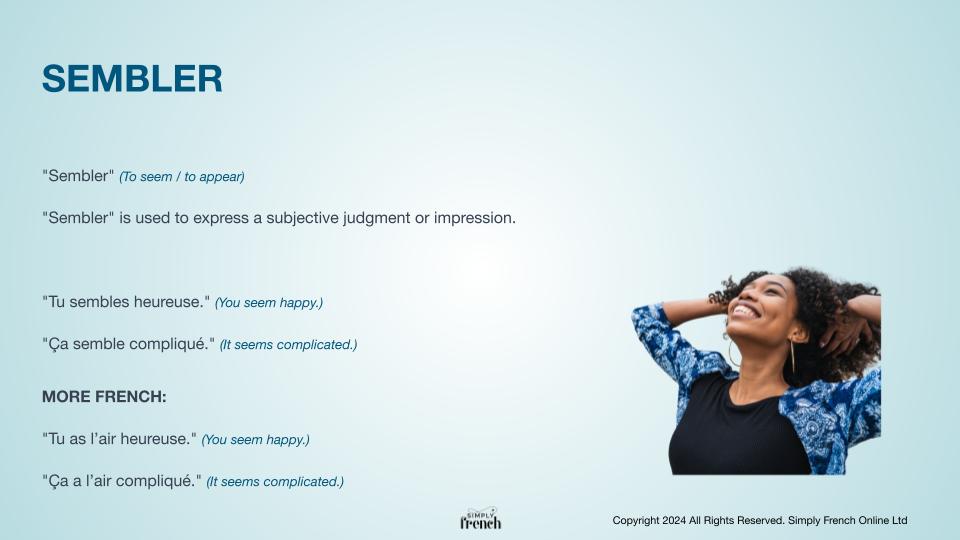sembler, ressember à, se ressembler
Feb 19, 2024Once you’ve got past the basic beginner phase, you start needing a bit more in-depth vocabulary. We know this. And trying to say “LOOKS LIKE” seems to pop up a lot at the moment, in conversations and as a question in my lessons.
If you’ve been caught up in the nitty-gritty of these 3 verbs - SEMBLE / RESSEMBLER À / SE RESSEMBLER then this is a mini-lesson for you!
In this mini-lesson, you’ll see
- The difference between sembler, ressembler à + se ressembler
- Examples and explanations of how these words are used
- How to sound more French using these commonly used verbs

What does SEMBLER mean in French?
The direct translation of sembler in English is seem. So, if you wish to describe an appearance, you can apply “sembler.
It’s a regular verb, thus quite easy to conjugate:
- Je semble >>> I seem
- Tu sembles >>> You seem
- Il / elle semble >>> S/he seems
- Nous semblons >>> We seem
- Vous semblez >>> You seem
- Ils / elles semblent >>> They seem
Generally, you have an adjective after the verb like this:
- Tu sembles heureuse >>> You look happy.
- Ça semble compliqué >>> It seems complicated.
However, French people naturally opt for this version:
- Tu as l’air heureuse >>> You look happy.
- Ça a l’air compliqué >>> It seems complicated.

The verb sembler to give your opinion.
If you add a pronoun or a person to the verb seem, it varies a little. This time, it gets more personal and it becomes an opinion, just like in English.
- Il me semble qu’il va pleuvoir >>> It looks like it might rain.
- Il lui semble qu’ils vont se marier >>> It seems to her/him they are going to get married.
Let’s review the pronouns you could play with:
- Il me semble >>> It seems to me.
- Il te semble >>> It seems to you.
- Il lui semble >>> It seems to him / her.
- Il nous semble >>> It seems to us.
- Il vous semble >>> It seems to you.
- Il leur semble >>> It seems to them.
Do you want to be more specific? You could say something like the following:
- Il semble à Marie >>> It seems to Mary.
- Il semble à ses parents >>> It seems to his/her parents.
Therefore, whenever you feel like giving your opinion, you can apply sembler à. Note that the structure “il semble” is impersonal. In French, we require the subject pronoun “il” meaning it.
If you want to know about the subject, have a look at this mini-lesson.

How to use ressembler à
This verb means that someone or something shares physical features or traits with another one. The translation of “ressembler à” is to resemble or to look like.
Fortunately, it’s a regular verb:
- Je ressemble >>> I look like
- Tu ressembles >>> You look like
- Il / elle ressemble >>> S/he looks like
- Nous ressemblons >>> We look like
- Vous ressemblez >>> You look like
- Ils / elles ressemblent >>> They look like
So, you would say:
- Il ressemble à son père >>> He looks like his dad.
- Les animaux de campagnie ressemblent souvent à leurs propriétaires >>> Pets often look like their owners.
As a reminder, because of the preposition à, some adjustments are required depending on the gender and number of the noun.
- ressemble à l’ >>> nouns starting with an h or a vowel
- ressemble au >>> masculine nouns
- ressemble à la >>> feminine nouns
- ressemble aux >>> plural nouns
Let’s apply it in sentences:
- Elle ressemble à l’actrice de la série >>> She looks like the series’ actress.
- Tu ressembles au président ! >>> You look like the president!
- Ça ressemble à la mayonnaise >>> It looks like mayonnaise.
- Ces gâteaux ressemblent aux gâteaux de ma grand-mère. >>> These cakes look like my grand-mother’s.

The distinction between ressembler à and se ressembler.
Se ressemble is a reflexive verb. In other words, the similarity is shared between 2 people. Indeed, it’s a mutual resemblance between things or people.
For instance:
- Le frère et la soeur se ressemblent beaucoup. >>> The brother and the sister look a lot like each other.
- Ils se ressemblent comme deux gouttes d’eau. >>> They look like two peas in a pod.

How to sound more French using sembler, ressember à + se ressembler.
Let’s recap our 3 verbs: sembler, ressembler à and se ressembler.
The first one is about subjective observations.
The second one expresses a resemblance between someone or something to another.
And finally, the reflexive verb indicates a mutual resemblance between people or things.

Which ones do you easily use in your conversations in French?
Here are other mini-lessons about nuances:
Tired and tired of something in French
Réaliser or se rendre compte: what’s the difference?
Douter and se douter are completely different
Free Masterclass
Learn my 4 step method of how to hold meaningful french conversations the R.E.A.L. way in just 30 minutes a day.
When you signup, we'll be sending you weekly emails with additional free content

